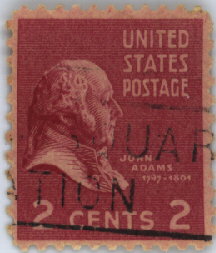FRtR > Outlines > American History (1990) > Chapter Two > The War of Independence: introduction (1/13)
An Outline of American History (1990)
Chapter Two
The War of Independence: introduction (1/13)
Next Page >
"We hold these truths to be selfevident
that all men are created equal, that
they are endowed by their Creator
with certain unalienabfr rights, that
among these are lift, liberty, and
the pursuit of happiness."
The Declaration of Independence, July 4, 1776
 John Adams, second President of the United
States, declared that the history of the American
Revolution began
as far back as 1620. "The Revolution," he said, "was effected
before the war commenced. The Revolution was in the minds and
hearts of the people." The principles and passions that led the
Americans to rebel ought, he added, "to be traced back for two
hundred years and sought in the history of the country from the
first plantation in America."
John Adams, second President of the United
States, declared that the history of the American
Revolution began
as far back as 1620. "The Revolution," he said, "was effected
before the war commenced. The Revolution was in the minds and
hearts of the people." The principles and passions that led the
Americans to rebel ought, he added, "to be traced back for two
hundred years and sought in the history of the country from the
first plantation in America."
As a practical matter, however, the overt parting of the ways
between England and America began in 1763, more than a century
and a half after the first permanent settlement had been founded
at Jamestown, Virginia. The colonies had grown vastly in
economic strength and cultural attainment, and virtually all had long
years of self-government behind them. Their combined population
now exceeded 1,500,000-a sixfold increase since 1700.
The implications of the physical growth of the colonies were
far greater than mere numerical increase would indicate. The 18th
century brought a steady expansion from the influx of immigrants
from Europe, and since the best land near the seacoast had
already been occupied, new settlers had to push inland beyond the
fall line of the rivers. Traders explored the back country, brought
back tales of rich valleys, and induced farmers to take their
families into the wilderness. Although their hardships were enormous,
restless settlers kept coming, and by the 1730s frontiersmen had
already begun to pour into the Shenandoah Valley.
Down to 1763, Great Britain had formulated no consistent
policy for her colonial possessions. The guiding principle was the
confirmed mercantiIist view that colonies should supply the mother
country with raw materials and not compete in manufacturing.
But policy was poorly enforced, and the colonies had never thought
of themselves as subservient. Rather, they considered themselves
chiefly as commonwealths or states, much like England herseff,
having only a loose association with authorities in London.
At infrequent intervals, sentiment in England was aroused
and efforts were made by Parliament or the Crown to subordinate
the economic activities and governments of the colonies to
England's will and interest - efforts to which the majority of the
colonists were opposed. The remoteness afforded by a vast ocean
allayed fears of reprisal the colonies might otherwise have had.
Added to this remoteness was the character of life itself in
early America. From countries limited in space and dotted with
populous towns, the settlers had come to a land of seemingly
unending reach. On such a continent natural conditions stressed the
importance of the individual.
Next Page >
 John Adams, second President of the United
States, declared that the history of the American
Revolution began
as far back as 1620. "The Revolution," he said, "was effected
before the war commenced. The Revolution was in the minds and
hearts of the people." The principles and passions that led the
Americans to rebel ought, he added, "to be traced back for two
hundred years and sought in the history of the country from the
first plantation in America."
John Adams, second President of the United
States, declared that the history of the American
Revolution began
as far back as 1620. "The Revolution," he said, "was effected
before the war commenced. The Revolution was in the minds and
hearts of the people." The principles and passions that led the
Americans to rebel ought, he added, "to be traced back for two
hundred years and sought in the history of the country from the
first plantation in America."